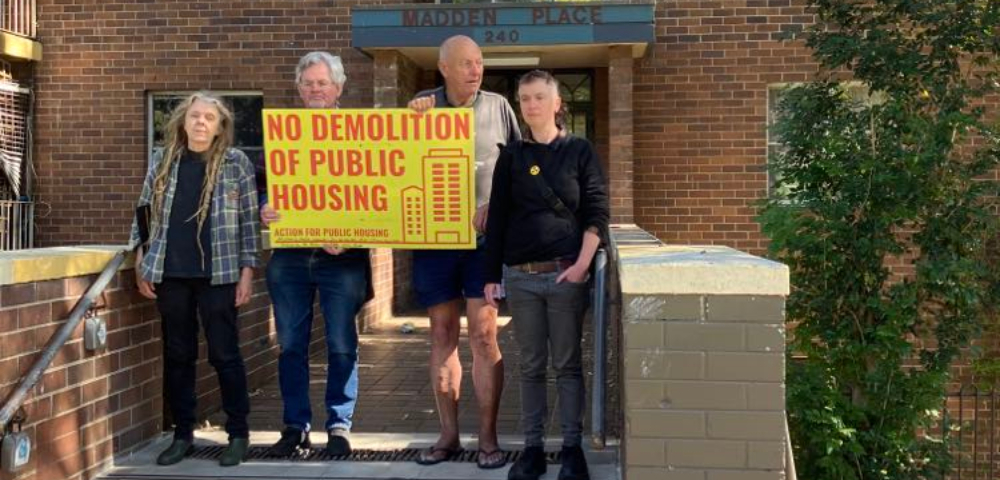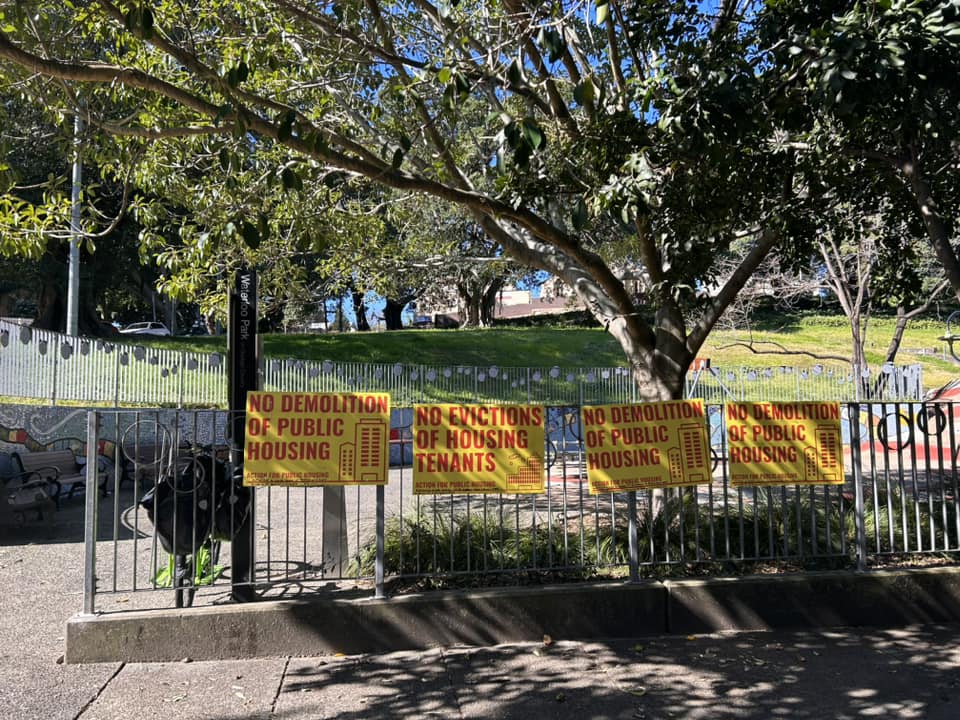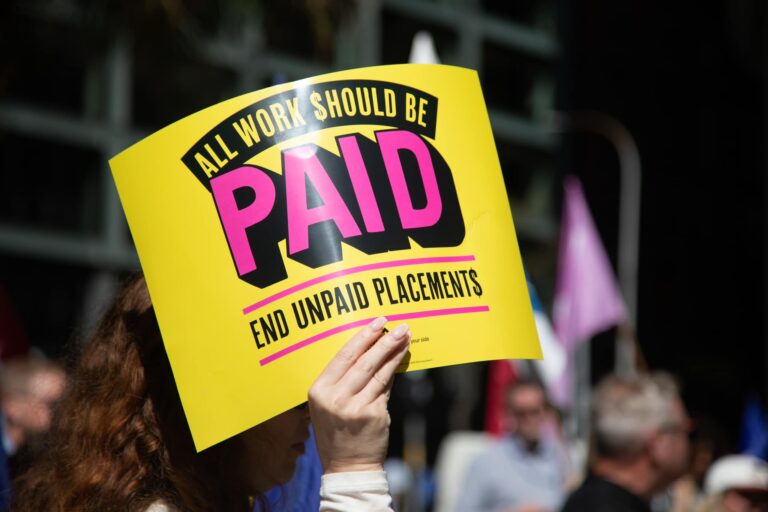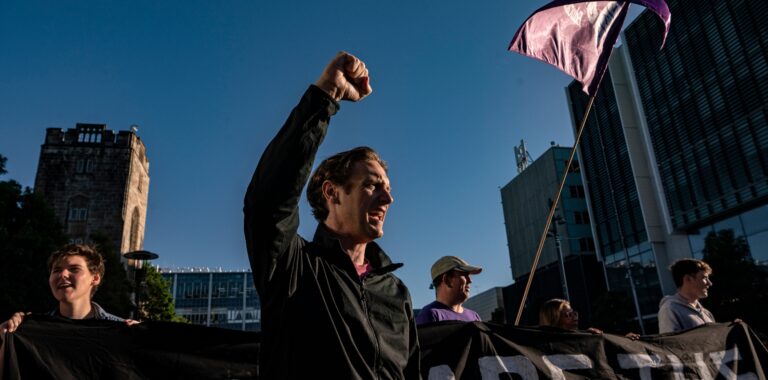
Dismay over planned Waterloo public housing demolition amid housing crisis

By ROBBIE MASON
The NSW Labor government has committed to the demolition and redevelopment of the Waterloo public housing estate, sparking frustration among tenants and advocacy groups.
Of the 3000 new apartments planned for the Waterloo South portion of the estate, half will be social and affordable housing, the NSW government announced yesterday. The announcement represents an improvement on the former government’s mandate of 34 percent social and affordable housing. The new plan will add 53 social homes, as well as 373 affordable homes, to the present number.
But the news has received mixed reactions. Impact tenants and community groups have condemned the announcement as inadequate and a clear-cut broken promise from NSW Labor.
Dr Alistair Sisson, a housing expert from the Macquarie School of Social Sciences and member of Action for Public Housing, condemned the announcement in light of the 55,000 households on the social housing waiting list and the “negligible growth” in public housing stock.
Dr Sisson said, “the Minns Government has barely improved the plan for Waterloo South.”
Geoff Turnbull from REDWatch, an inner-city community action group, said the proposed increase in the number of social and affordable homes is “very modest”.
“It isn’t going to make a dent in terms of the waiting list”, Turnbull said.
Shelter NSW chief executive John Engeler said the revised plans represent a significant improvement on the original proposal. But he wants to see the state government and urban planners present a more radical vision for the central and northern portions of the public housing estate.
Waterloo residents speak out
At a press conference hosted by Action for Public Housing yesterday, Karyn Brown, a South Waterloo resident and Action for Public Housing member, said she was against the demolition of homes in a housing crisis.
Action for Public Housing have long held a policy of “no demolitions” to public housing and filling vacant homes.
In Karyn’s words, bulldozing public housing is “like trying to stop a flood with a firehose.”
“It will give Sydney yet another vacant block of land,” she continued.
Ruby, a relatively new resident at the Waterloo Estate, said they do not feel at all secure in their current housing. The uncertainty of the site’s future has fostered an atmosphere where residents are “barely able to talk to each other” and “do not feel comfortable voicing their opinions to a largely white middle class government about their business plans for the area”.
Despite the atmosphere of apprehensiveness and the presence of crime, Ruby expressed affection for the Waterloo Estate, labelling the tower blocks “a safe haven” and the people “vibrant”.
Ruby sympathised with neighbours who have lived in Waterloo for decades.
“There’s no respect for the history of a neighbourhood and its culture,” they said. “There are famous locals and respected elders who’ve been here almost all their lives.”
Waterloo Estate tenants are the not only locals who will miss the effervescent inner-city public housing community.
Andrew Chuter, President of Friends of Erskineville, told City Hub, “one thing that makes the inner city so great is the diversity of cultures, backgrounds and viewpoints. We want people of all means to be able to live here but the demolition and privatisation of public housing is making it a place for only the wealthy.”
Ruby said, “there should be more public housing” but gave City Hub one important caveat: “fix and maintain what you have. It seems a huge project for not much gain.”
Dr Alistair Sisson made a similar point: “The homes in Waterloo South are decent quality; there has never been a condition assessment to prove that they are inadequate or beyond repair.”
“A better approach would be to refurbish the homes in Waterloo South, acquire new homes and build new public housing on sites like North Eveleigh, which are being redeveloped by the NSW Government without a single public housing dwelling,” he continued.
Echoing the stance of Dr Sisson, Waterloo resident Karyn Brown said, “the destruction of perfectly good homes is environmentally unsound, they should be retained and refurbished to have the longest life possible. We have done away with disposable shopping bags, it is time we stopped seeing people’s homes as disposable.”
Norrie, another Waterloo Estate resident, said her living situation has been up in the air ever since she moved into the area. But she acknowledged that Labor’s announcement yesterday possesses more merit than the plan of the former Liberal government.
She said she is open to relocation, provided the eventual redevelopment houses a larger portion of vulnerable citizens.
“It’s an inconvenience moving but I can cop it if it means a lot more people are going to get housed. I appreciate having an affordable roof over my head. I wouldn’t begrudge anyone else having that right.”

Broken promises
NSW Labor came into power this year on the back of a “Hands Off Waterloo” pre-election campaign. In the build up to the state selection, local Labor MP Ron Hoenig sent letters to Waterloo public housing tenants telling them they could “stop the sell-off of the Waterloo Public Housing Estate” and “protect” their homes by voting Labor.
Labor’s backing of public housing did not emerge from thin air. At a NSW Labor conference in October 2022, Labor made a concrete pledge to implement a moratorium on the sale, outsourcing and leasing of any public housing assets or services.
Despite inconsistent messaging and slow communication with inner-city public housing tenants plaguing the state government in recent months, Housing Minister Rose Jackson has stuck to the rhetoric that Labor will defend public housing. Speaking at a REDwatch meeting in June this year, Housing Minister Rose Jackson indicated that she considers the conference resolution to be the state government’s policy.
But critics have pointed out that Labor’s housing policy runs contrary to the pledge of no privatisation. The state government is selling public housing “by stealth” Zac Gillies-Palmer has written for Jacobin.
In June this year, tenants told The Guardian they felt misled. Some had dug into their own pockets to fund home repairs, erroneously believing their homes were safe following Labor’s promises.
Friends of Erskineville President Andrew Chuter said the announcement of the small boost to social and affordable housing is “disappointing given the statements and commitments made before the state election”.
Even social housing can be managed by a third-party operators, Action for Public Housing have stated, as social housing includes community housing, which not-for-profit organisations tend to manage. Community housing providers can charge higher rent and more easily evict tenants.
This renders the provision of an additional 53 social homes in Waterloo South, as per the state government’s announcement yesterday, a relatively insipid pledge to those invested in preserving public housing.
Norrie harbours reservations over the management of her future Waterloo domicile. She told City Hub that she had lived in co-operative affordable housing prior to her move to Waterloo in 2018. There, the rules were stricter. She wasn’t allowed to have any pets, meaning temporary separation from her cat, and she wasn’t allowed to smoke indoors. She doesn’t want a repeat.
Concerns raised over the implications of the affordable housing boost
Community groups are wary of Labor’s focus on affordable housing which is often inaccessible for low-income earners.
Action for Public Housing have pointed out that a two-bedroom ‘affordable’ apartment in Waterloo, if built today, could be leased for $776 per week. The group have drawn the data from the latest rental bond lodgements.
Affordable housing will make up 20 percent of the new homes built in Waterloo, while social housing will make up 30 percent.
Geoff Turnbull from REDWatch told City Hub that “the chances of people being pulled from the [social housing] waiting list into affordable housing are relatively small” due to the preference among affordable housing providers for tenants with employment and the focus on retaining “key workers” within the inner city.
The independent non-profit organisation Shelter NSW, however, views the affordable housing boost more favourably.
CEO John Engeler stated, “we’ve long called for more affordable rental housing – in addition to social housing, not instead of it. We are pleased to see a substantial amount of affordable housing being locked in for this site. This type of housing and tenancy offers hope for key workers, particularly those currently supporting the local community.”
It is not clear whether the affordable housing earmarked for Waterloo South will remain affordable housing in perpetuity. According to current planning laws, affordable housing only needs remain as such for 15 years.
When questioned in NSW parliament by the Member for Newtown, Jenny Leong, NSW Premier Chris Minss refused to make a commitment and mandate that affordable housing at Waterloo South remain affordable in the long-term.
Save Waterloo supporters express solidarity
A wide range of forces have come out publicly in support of South Waterloo tenants and the stance of Action for Public Housing including the Combined Retired Union Members Association (CRUMA).
Yesterday’s announcement has attracted criticism from prominent Greens politicians. In a media statement, Jenny Leong, the Member for Newtown and Greens NSW Spokesperson for Housing and Homelessness said that NSW Labor have failed to end the Liberal Party’s “privatisation agenda”.
“Instead they are continuing this shameful legacy of evicting public housing tenants from their homes, for insulting increases to social housing stock that barely touch the sides of the housing crisis.”
Sylvie Ellsmore, meanwhile, City of Sydney Deputy Mayor and Greens Councillor stated, “the maths simply doesn’t stack up that we need to privatise so much public land to upgrade public housing. The decision to rezone and privatise public land worth billions of dollars need to be the subject of public scrutiny.”









